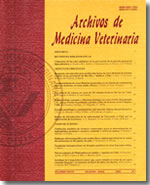Effect of the supplementary feeding with Plantago lanceolata on the egg output of gastrointestinal nematodes in calves
Main Article Content
Abstract
The purpose of this study was to evaluate whether Plantago lanceolata (narrow leaf plantain), as a supplemental forage, reduces the egg output of gastrointestinal nematodes in calves. The trial was conducted on a farm in the 10th Region, Chile. Two groups of 15 calves weighing 171.4 ± 19.8 kg grazed 17 hours a day on a pasture composed mainly of gramineous and with a high infestation of trichostrongylid nematode larvae. During the remaining 7 hours, the control group grazed in a pasture of similar botanic composition but with a low parasite burden; the plantago group grazed in a pasture specially sown with P. lanceolata with also a low parasite burden. This regimen was maintained for 60 days. Each week the animals were weighed and faecal samples were gathered to determine the nematode egg count (epg) and larvae generic differentiation. Grass samples were taken every two weeks from all pastures to establish their level of parasite burden. Precipitation was measured daily. The parasite burden of grass in the contaminated pasture was high during the whole period. Three weeks after the initiation of the trial, an increase in the average of eggs per gram of faeces (epg) was observed. A significant difference (P < 0.05) in the averages of egg counts of Ostertagia and Trichostrongylus were observed from the 4th to the 7th week of the supplementation period, being lower in the Plantago supplemented group. All animals gained weight during the first 3 weeks, then the P. lanceolata supplemented group increased its weight by and average of 8.05 kg per animal more than the control group, however this difference was not significant (P > 0.05). It is concluded that the inclusion of P. lanceolata as a supplemental forage significantly reduces the egg output of gastrointestinal parasites.

